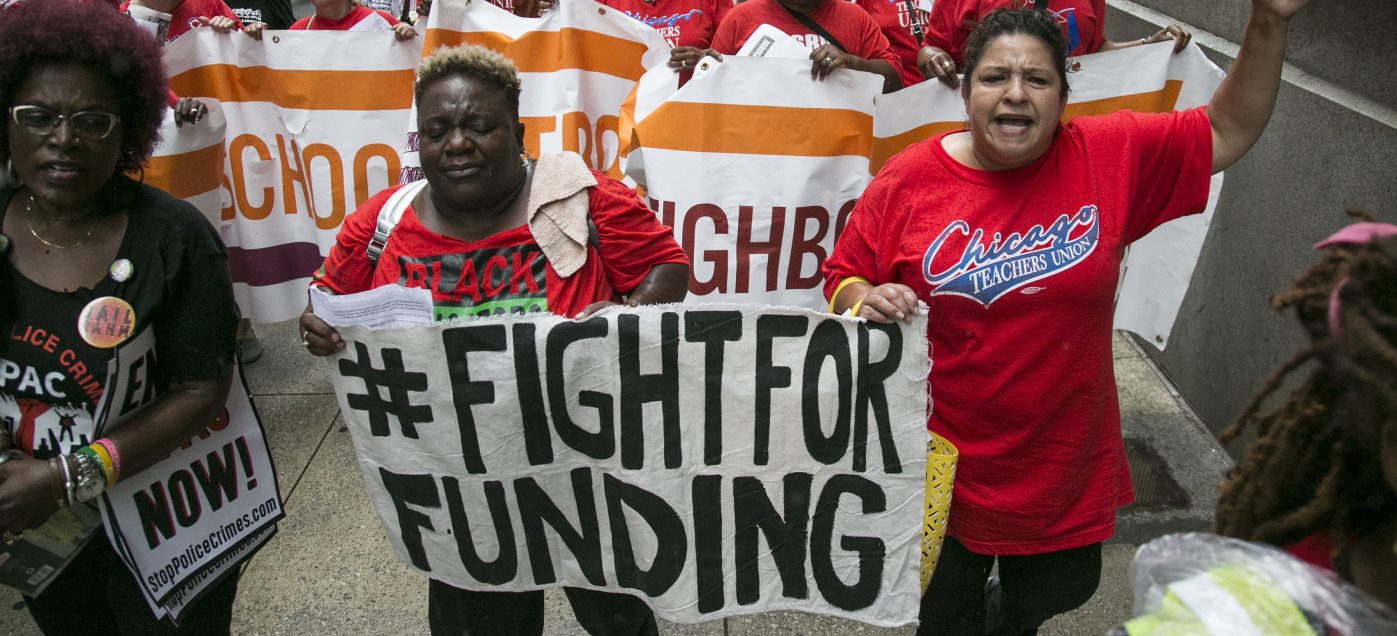Citation for above image: (CTU plans May Day rally calling for more school funding. (2017, April 28). Chicago Sun Times. Retrieved May 17, 2018, from https://chicago.suntimes.com/news/ctu-plans-may-day-rally-calling-for-more-school-funding/)
Robert Fitzgerald discusses the gross funding inequity between students living in wealthy neighborhoods and students living in poorer neighborhoods of Illinois and how, philosophically, this is unjust (Fitzgerald, 2015). Rucker Johnson reviews data from “school district spending and administrative on Title I funding to nationally representative data on children born between 1950 and 1977 and followed through 2011,” to show how certain federal funding programs try to make up for the inequities by directing resources to those schools and students in need (Johnson, 2015, p. 50). He argues that despite what some think, this type of funding does in fact make a positive impact on those students (Johnson, 2015).
One way Fitzgerald conceptualizes issues within the Illinois educational system is by using philosopher John Rawls’s theories on justice and equity (Fitzgerald, 2015). Fitzgerald poses the question of: “under the veil of ignorance, would a rational citizen create or be willing to accept a school funding arrangement where one group—those with high property values—benefitted significantly more in the distribution of resources than others?” (Fitzegrald, 2015, p. 59). In other words, through Rawls’s theories, Fitzgerald is essentially indicating that people would not want to live in a system where if in that system there was a chance that they could be on the disadvantaged end of the spectrum; Fitzgerald contends that this, however, is the system that we do live in and, thus, according to Rawls’s principles, Illinois’s current system is unjust, as funding disproportionately goes to schools in wealthier neighborhoods, which unfairly leaves other schools without adequate funding (Fitzgerald, 2015).
This issue of school funding is a topic that Johnson attempts to tackle using data and research. Many argue that addressing Fitzgerald’s concerns of lacking school funding is not effectively addressed by just injecting federal funding into those schools; however, Johnson’s research shows that this specific Title I funding does in fact create benefits for students in those schools, and that it can be considered a solution (Johnson, 2015). Johnson explains how in fact “increases in Title I funding are significantly related to increases in the likelihood of graduating from high school, reductions in both the likelihoods of grade repetition and school suspension or expulsion, more years of completed education, higher earnings and work hours, a reduction in the annual incidence of poverty in adulthood (ages thirty to forty), and a reduction in the likelihood of ever being incarcerated by age thirty-five” (Johnson, 2015, p. 72). This is quite significant; however, he also explains how increasing funding is a “necessary” but not sufficient way of improving educational quality for poorer students (Johnson, 2015, p. 72). Nevertheless, an increase in Title I funding across the country could serve as a way to remedy Fitzgerald’s specific concerns about Illinois public schools, as Johnson’s data shows that even an increase in $100 per pupil can lead to a “reduction in the likelihood of grade repetition” all the way to an “increase in adult wages” (Johnson, 2015, p. 67, 68).
References
Fitzgerald, Robert. (2015). Philosophy Rather than Finance: Redirecting the Discourse Concerning Inequitable School Funding in Illinois. Philosophical Studies in Education Volume 46. 52-61. Retrieved from http://eric.ed.gov/?id=EJ1076666.
Johnson, Rucker C. (2015). Follow the Money: School Spending from Title I to Adult Earnings. RSF: The Russell Sage Foundation Journal of the Social Sciences, Vol. 1, No. 3, The Elementary and Secondary Education Act at Fifty and Beyond. 50-76. Retrieved from http://www.jstor.org/stable/pdf/10.7758/rsf.2015.1.3.03.pdf?refreqid=excelsior%3A04a485e259336f5f79c280b3a3732582.
